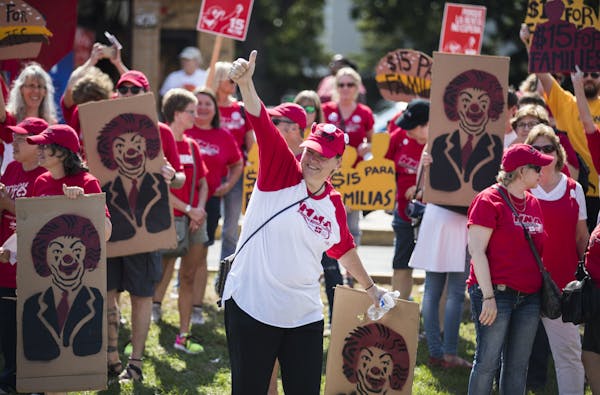Some local nonprofits are starting to boost their wages as a moral and economic good.
Nonprofit landlord and developer Aeon raised the minimum pay for its workers to $15 this year, $5.50 more than the state's minimum — ensuring a raise for 34 of its 119 employees. People Serving People, which helps homeless families, has set a minimum wage of $14.50.
The increases come as cities across the country, including Minneapolis, grapple with ordinances that would raise minimum wages. And as the metro area wrestles with disparities between workers of color and whites, raising pay is a way to lift everyone up, said Craig Warren, chief operating officer of the Greater Twin Cities United Way.
"Part of our mission is creating pathways out of poverty," Warren said. All 125 local United Way employees make at least $20 an hour, although a majority have bachelor's degrees and many have public sector experience.
Nonprofit leaders say that paying a livable wage is a moral mandate that dovetails with their larger missions. "Leadership means just that — to lead. And quality leadership means doing what's right. And it's right that the committed people who work at Aeon can afford to live," said Aeon CEO Alan Arthur.
Higher wages also help nonprofits retain employees and make jobs in the sector affordable for people who find the work rewarding.
"The goal is to get nonprofits out of the church basement. We don't want to be second-class employers," said Jon Pratt, executive director of the Minnesota Council of Nonprofits. "Do we want our employees to be eligible for our services? Are you actually creating more of the problem than you're solving?"
Gwen Campbell, development director for People Serving People, said it just wasn't right that some of their employees, tasked with helping homeless families get on their feet, had to struggle to pay their own rents. The higher wage meant that about 20 of 70 employees got a raise.
"A budget is an expression of your values and where you want to go in the future," Campbell said.
Joc'Quil Crawford, who works in the kitchen and computer lab at People Serving People, was thrilled when she got an hourly raise of nearly $2. She now makes $14.50 an hour.
"It was exciting," said Crawford, 30. "It was a relief, actually. With one check I am now able to pay the rent."
'In a competition for talent'
About 310,000 Minnesotans work for nonprofits, making up about 11.5 percent of the state's employed residents. Excluding hospitals and higher education — fields that typically pay more — it's about 7.2 percent.
While nonprofit pay historically has lagged behind the private and government sectors for equivalent jobs, that gap has been closing in the past two decades, said Pratt, whose organization conducts a comprehensive pay survey.
Nonprofit wages, excluding hospitals and colleges, now are about 10 percent below for-profit average annual wages and 5 percent below the government sector, according to the most recent survey.
When a well-meaning Minnesota legislator tried to carve out an exception for nonprofits in the state's new minimum-wage standards, the Council of Nonprofits said no thanks. Pratt said asking for an exemption sent the wrong message. "We are in a competition for talent," he said.
But while some nonprofits have found room in their budgets to pay higher wages, others say just meeting the new state minimum wage of $9.50 has posed a challenge — especially for those who rely heavily on part-time laborers.
"All community action agencies philosophically would love to be able to pay living wage. The resources just aren't there to do it. Each one deals with that locally," said Arnie Anderson, executive director of Minnesota Community Action Partnership.
"The tension is, do you use the resources available to serve low-income people to meet basic needs or do you use the resources for staffing?"
Boys and Girls Clubs of Central Minnesota struggled to pay the increased minimum wage of $9.50. It employs 200 part-timers, mostly college students studying to be teachers and counselors, and 50 full-timers. "That's still not high enough to attract the folks with the skills we need in working with young people. It's been difficult," said Executive Director Mark Sakry.
The nonprofit is now considering raising its part-time hourly wage by $1 or more so it can fill open positions. All full-timers get paid more than $14 an hour, Sakry said.
Taking the stress off
Neighbors, a South St. Paul nonprofit that includes a food shelf and Christmas assistance, pays all 13 of its full-time workers at least $14 an hour.
"We try very hard to make sure we are paying a wage that hopefully they are able to live on," said Executive Director John Kemp. "I would rather we be light on people than have people we are not paying a decent wage."
Neighbors, which has an annual $1 million budget, relies on thousands of volunteer hours each year, the equivalent of 25 full-time employees.
Charities are judged, in part, by how much of their money goes to their mission. Keeping administrative costs down is critical to courting donors and accomplishing goals.
"We have to balance that all the time," Kemp said.
Clearly, getting a raise can be a life-changing event for nonprofit employees.
For Crawford, who has worked at People Serving People for six years, the extra money will help her take care of her 11-year-old daughter. Crawford said she's trying to save money so she can buy her a computer for schoolwork.
"It takes a lot of stress off," she said.
Shannon Prather • 612-673-4804

A tale of 124 hoarded Minnesota cats has at least a hundred happy endings

Walz, St. Paul leaders urge support for copper wire theft bill: 'We've got to get in front of it'
Body of missing canoeist, 15, recovered from southwest Minnesota lake

High winds flipped a FedEx truck traveling on Bong Bridge in Duluth

